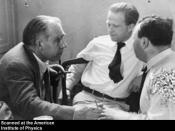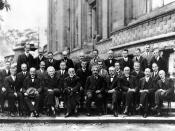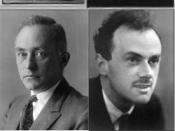Werner Heisenberg
One cannot fully appreciate the work of Werner Heisenberg unless one examines his contributions in the context of the time in which he lived. Werner Karl Heisenberg was born in Wuerzburg, Germany, on December 5, 1901, and grew up in academic surroundings, in a household devoted to the humanities. His father was a professor at the University of Munich and undoubtedly greatly influenced young Werner, who was a student at the Maximilian Gymnasium.
Heisenberg had the opportunity to work with many of the top physicists in the world including Niels Bohr and Max Born. Like many of the top physicists of the time Heisenberg received his doctorate at an early age. In Heisenberg's case he received it at the young age of twenty three. Heisenberg was not just a researcher. He was also a professor and author. During his career he taught at many prestigious universities, including the Universities of Leipzig, Goettingen, and Berlin.
He also wrote many important books including, Physical Principles of the Quantum Theory, Cosmic Radiation, Physics and Philosophy, and Introduction to the Unified Theory of Elementary Particles. In 1932 he won the Nobel Prize in Physics for his work in Quantum Mechanics.
With the Nazi's in power, and World War two on the horizon it was inevitable that his German heritage would play a crucial role in his career. Before Germany's blitzkrieg on Poland Heisenberg decided to make one final visit of his friends in the West. Many tried to convince him to stay and accept a professorship at Columbia, but Heisenberg declined. He felt that it was his duty to preserve the foundation of science in Germany during the war. He also believed that by staying in Germany during the war, he could help individual German scientists. In fact, he did offer jobs...


